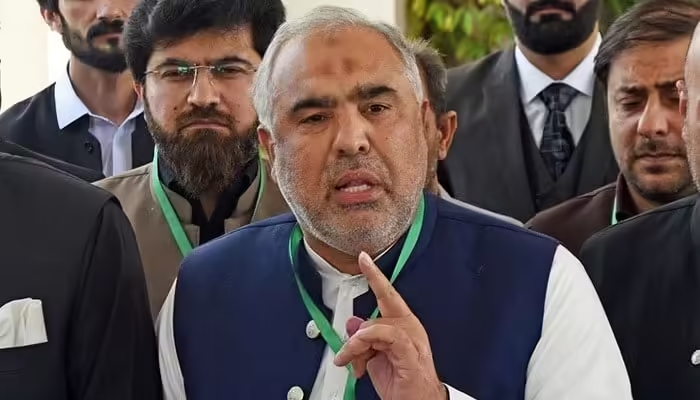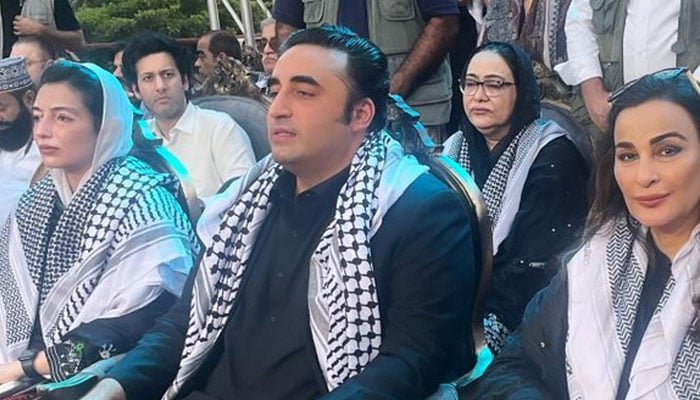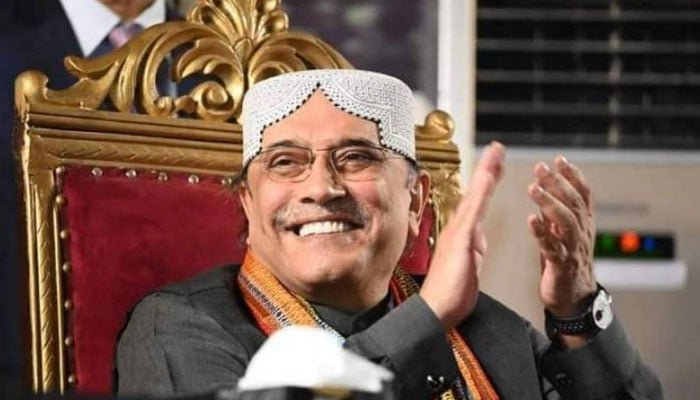Peshawar: Pakistan Tehreek-e-Insaf (PTI) leader and former Speaker of the National Assembly, Asad Qaiser, recently made startling revelations about attempts to sway PTI members of the National Assembly (MNAs) regarding upcoming constitutional amendments. Speaking to the media in Peshawar, Qaiser claimed that members of his party were being offered a staggering Rs 20.20 crores each in exchange for their support of the government’s proposed amendments. Despite these pressures, he asserted that none of the PTI MNAs would succumb to these offers.
Constitutional Amendments and Government Pressure
According to Asad Qaiser, the government is pushing for constitutional amendments, expected to be introduced on the 17th or 18th of the month. He referred to the current regime as a “fascist government,” accusing it of planning to force the passage of these amendments through the National Assembly. The urgency with which the government is reportedly moving has raised concerns about the nature of the proposed amendments and the methods being employed to garner support.
Qaiser expressed his party’s strong opposition to what he called the government’s coercive tactics, stating, “Our MNAs are being pressured and offered Rs 20.20 crores, but none of our members will budge.” He emphasized that PTI would not allow the government to pass legislation that undermines the judiciary or democracy in Pakistan.
Pressure on PTI MNAs
Asad Qaiser’s comments reflect the growing tension between the government and opposition parties, particularly PTI. The alleged monetary offers to PTI MNAs highlight the lengths to which the government may be going to secure the necessary support for the constitutional amendments. Qaiser remained firm in his belief that his party members would resist such offers, maintaining their loyalty to PTI and its leadership.
Despite the pressures, Qaiser’s confidence in his party members remains unshaken. He is convinced that none of the PTI MNAs will accept the government’s alleged bribes and that the party will stand united against the proposed amendments. This revelation further underscores the ongoing political battle in Pakistan, where both sides are employing different strategies to achieve their legislative goals.
Shortfall in Government’s Support for Amendments
Reports suggest that the government currently lacks the required numbers to pass the constitutional amendments. Specifically, they are short by five senators and seven members of the National Assembly (MNAs) needed to reach the “magic number” necessary to ensure the passage of the amendments. This gap in support has likely led to the alleged offers being made to PTI MNAs, as the government attempts to secure the necessary votes.
This situation reflects the fragile nature of political alliances in Pakistan’s parliament. With a significant shortfall in numbers, the government appears to be exploring all possible avenues to gain support, even if it means resorting to questionable tactics. However, PTI’s resistance could prevent the government from successfully passing the amendments, potentially leading to further political instability.
PTI’s Defense of the Judiciary
One of the major concerns voiced by Asad Qaiser is the government’s intention to weaken the judiciary through the proposed amendments. He expressed PTI’s firm stance against any legislation that would harm the independence of the judiciary, urging all bar associations across the country to remain vigilant and to take the matter into their confidence. “We will not allow them to attack the judiciary,” Qaiser stated, signaling PTI’s strong opposition to any amendments that would undermine the judiciary’s role as a check on government power.
This defense of the judiciary is a key issue for PTI, which has consistently opposed any efforts by the government to interfere with the judicial process. The party views the judiciary as an essential pillar of democracy and is determined to protect its independence.
Call for Dialogue, Not Violence
Asad Qaiser also addressed the broader political climate in the country, emphasizing the need for dialogue over violence. Referring to the provincial government’s interaction with caretaker Punjab Chief Minister Mohsin Naqvi, Qaiser stressed that conflicts should be resolved through negotiations, not force. “The resolution of conflicts is not in violence but in negotiations,” he remarked, calling for a more diplomatic approach to handling political differences.
Qaiser lamented that the country had reached a point where issues were being addressed through violence and the use of force, rather than through peaceful dialogue. His comments reflect PTI’s stance that the current political situation in Pakistan requires thoughtful negotiation and compromise, rather than aggressive tactics.
The Closure of KP House and Unfulfilled Promises
In his media briefing, Qaiser also touched upon the closure of Khyber Pakhtunkhwa (KP) House, expressing deep sorrow over the situation. He criticized the federal government for failing to give the province and its people their rightful due. He further highlighted the plight of the people in the tribal districts, noting that many of the promises made to them have yet to be fulfilled.
“The closure of KP House is very sad,” Qaiser said, adding that the federal government’s actions were hurting the province and its residents. The failure to address the needs and concerns of the people of Khyber Pakhtunkhwa, especially those in the tribal districts, has only added to the growing sense of disenfranchisement in the region.
Asad Qaiser’s revelations about the alleged offers of Rs 20.20 crores to PTI MNAs regarding constitutional amendments have added another layer to Pakistan’s complex political landscape. His comments highlight the intense pressure being placed on opposition members and the government’s apparent desperation to pass controversial legislation. PTI remains steadfast in its opposition to any amendments that threaten the judiciary or undermine democracy, while also calling for dialogue and peaceful resolution of conflicts.
The closure of KP House and the unfulfilled promises to the tribal districts further underscore the challenges facing Pakistan’s provincial governments. As the political situation continues to evolve, the coming days will reveal whether the government can garner the support it needs for the constitutional amendments or if PTI’s resistance will prevail.



